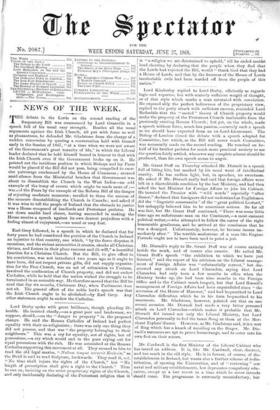Lord Derby spoke with great brilliance, though pleading ill- health.
He insisted chiefly,—as a great peer and landowner, we suppose, should,—on the " danger to property" in the proposed change. He said the Roman Catholics of Ireland had perfect equality with their co-religionists ; there was only one thing they did not possess, and that was " the property belonging to their neighbours." This was a cry for equality, not of rights, but of possessions,--a cry which would end in the poor crying out for equal possessions with the rich. He was astonished at the Roman Catholics supporting this movement at all. They seemed to him to read the old legal maxim, "Nullum temples occurrit Ecclesix," as the Devil is said to read Scripture, backwards. They read it, not, " No time shall injure the rights of the Church," but " No length of prescription shall give a right to the Church." Thus he ran on, insisting on the strict proprietary rights of the Church, and only incidentally declaring of the Protestant religion that it is "a religion we are determined to uphold," till he ended amidst loud cheering by declaring that the people when they find that the Lords had rejected the Bill, would " thank God that they had a House of Lords, and that by the firmness of the House of Lords incalculable evils had been warded off from the people of this nation."






























